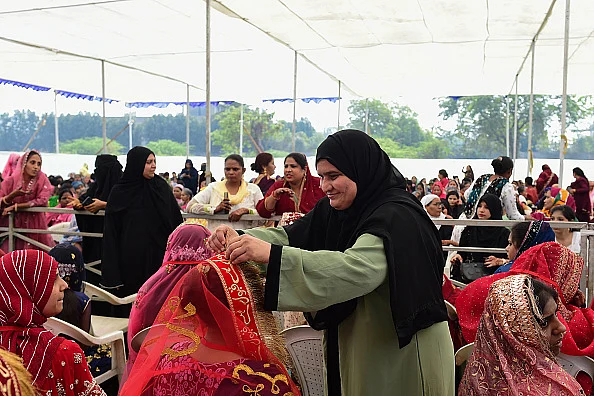Written by Juhi Sidharth and Karishma Shah
Since 1954, the Special Marriages Act (SMA) has come to the rescue of inter-faith and inter-caste couples who want to marry against the wishes and diktats of their families and communities. It is one of the most radical laws in the country that supports couples who dare to break the age-old rules surrounding marriage.
Unfortunately, though, as it often happens, Indian society has lagged behind this progressive law, with most couples still opting for endogamous arranged marriages.
As the much-discussed survey conducted among 1,60,000 households by the Lok Foundation-Oxford University revealed, more than 90 per cent of couples in their 20s had had arranged marriages. Conducted in 2021, with over 30,000 Indian participants, the Pew Research study revealed that despite the increasing openness towards personal belief systems, love marriages are uncommon in India, and inter-faith marriages are even rarer. For example, around two-thirds of Hindus wish to prohibit inter-faith marriages for Hindu men (65 per cent) and Hindu women (67 per cent). Similarly, high proportions of Muslims hold the same stance for Muslim men (76 per cent) and women (80 per cent).
However, even though data indicates that an overwhelming majority of young Indians continue to go for arranged marriages, the tides are slowly changing. More and more couples are questioning the institution of marriage, opting instead to go for live-in relationships. As shown in a study by Lionsgate Play in 2023, half of the participants believe that being in a live-in relationship before committing to a long-term partnership is crucial for gaining a deeper understanding of their partner. Similarly, a 2018 InShorts study with 1,40,000 people found that about 80 per cent of participants, mainly aged 18-35 years, were in favour of live-in relationships, with 26 per cent expressing a desire for a lifelong live-in arrangement.
Enter the new Uniform Civil Code (UCC) bill of Uttarakhand passed on February 7, 2024, that seeks to establish common rules for all citizens concerning property inheritance, marriage, divorce, and live-in relationships. Although the bill includes a positive provision that ensures that every child is recognized as a legitimate offspring, regardless of their parent’s marital status, it has been rightly criticised for including a contentious clause that seeks to make it mandatory for live-in couples to register with the police.
Section 378 of the UCC bill says, “It shall be obligatory for partners to a live-in relationship within the State, whether they are residents of Uttarakhand or not, to submit a statement of live-in relationship under sub-section (1) of section 381 to the Registrar within whose jurisdiction they are so living.”
The bill stipulates that individuals cohabiting in a relationship for over a month without formal registration may be subject to consequences. More specifically, under clause 368 if an unmarried couple living together receives a notice from the registrar to register their relationship but fails to do so, they may face a penalty of imprisonment for up to six months, a fine of up to Rs 25,000, or both. Moreover, clause 387 (2) states that if either partner provides false information or withholds “important” details from the registrar, they may face imprisonment for up to three months, a fine of up to Rs 25,000, or both. The absurdity does not end here, as couples are also supposed to report to the police in the event of a break-up.
One state official has argued that the registration clause will protect women from abuse in live-in relationships, citing a couple of recent horrific crimes against women in such relationships. However, as the aphorism, ‘hard cases make bad law’ goes, this poorly conceived clause is not only unlikely to prevent intimate partner violence, but will also end up needlessly harassing a vast majority of couples. Moreover, the existing Domestic Violence Act of 2005 already provides protection to both married and unmarried women within homes.
Crucially, the bill’s provisions overlook the evolving nature and dynamics of intimate relationships in contemporary Indian society. A growing acceptance of live-in relationships, upheld by the Supreme Court’s recognition of the Right to Life under Article 21, underscores the need for a legal framework that accommodates diverse forms of partnership in the country. In fact, in the 2010 landmark case of S. Khushboo v. Kanniammal, the Supreme Court of India held that a live-in relationship falls within the scope of the Right to Life under Article 21 of the Constitution of India. The court also determined that cohabitation between two consenting adults in a live-in relationship cannot be deemed unlawful or illegal.
While this UCC bill, if enacted, will undermine the personal liberty of all couples, it will be specifically used to target inter-caste and inter-faith couples. Already under pressure from families and communities, these couples will now come under the direct and hostile scrutiny of the state. Combined with the ‘love-jihad’ law that has been passed in several states, this bill is a regressive step that scuttles individual freedom and privacy. Lastly, it is an affront to the vision of BR Ambedkar, who through the Special Marriages Act of 1954, sought to make it easier for inter-faith and inter-caste couples to be together.
(Juhi Sidharth is an Assistant Professor of Public Policy at FLAME University, Pune. Karishma Shah is a Research Associate at the Centre for Knowledge Alternatives, FLAME University, Pune. Views expressed are personal.)





















